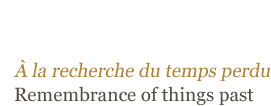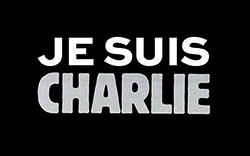


Academic Resources
Proust: In Search of Lost Time
Course Description
Lit 315: Proust: In Search of Lost Time
Marcel Proust's In Search of Lost Time is about an elaborate, internal journey, at the end of which the narrator discovers the unifying pattern of his life both as a writer and human being. Famed for its style and its distinctive view of time, love, sex and cruelty, reading, language and memory, Proust's epic broke new ground in the invention of a genre that lies between fiction and autobiography. Through a semester devoted to the close reading of Swann’s Way and Time Regained in their entirety and several substantial key-excerpts taken from all the other volumes, we will try to understand the complex nature of Proust's masterpiece and, among other things, examine the ways by which it accounts for the temporality and new rhythms of modernity. We will also question the narrative and stylistic function of homosexuality, discuss the significance of the massive social disruption brought about by the Great War and see how the arts are represented and why they are seminal to the narration. Additional readings will include philosophy, art criticism and literary theory. Taught in English. Course Readings
Weeks One through Four
- Proust, Marcel. “Prologue.” On Art and Literature. New York: Carrol and Graf, 1997. 19-26.
- Shattuck, Roger. “How to Read a Roman-Fleuve.” Proust’s Way. New York: W. W. Norton, 2000.
- Landenson, Elisabeth. “Gilberte’s Indecent Gesture.” Proust in Perspective. Ed. A. Kotin Mortimer and K. Kolb. Urbana: University of Illinois Press, 2002. 147-156.
- Barthes, Roland. “Longtemps, je me suis couché de bonne heure …” The Rustle of Langauge. New York: Hill and Wang, 1986: 277-290.
- Deleuze, Gilles. “Signs and Truth.” Proust and Signs. London: Penguin Press, 1972. 15-24.
Weeks Five through Eight
- Wood, Michael. “The Death of Paradise.” Philosophy and Literature 21, 2 (1997): 245-261.
- Poulet, Georges. Proustian Space. Baltimore: Johns Hopkins UP, 1997. 37-48.
- Brami, Joseph. “Strange Jewishness: Essay on the Treatment of Jewish Identity in Proust.” The Strange M. Proust. Ed. André Benhaïm. London: Legenda, 2009. 45-55.
- Schehr, Lawrence R. “Proust: Forgetting Homosexuality.” French Gay Modernism. Urbana: University of Illinois Press, 2004.
- Proust, Marcel. “A Race Accursed.” On Art and Literature. New York: Carrol and Graf, 1997. 210-229.
Weeks Nine through Twelve
- Sedgwick, Eve Kosoksky. “Proust and the Spectacle of the Closet.” Epistemology of the Closet. Berkeley: University of California Press, 1990. 213-251.
- Bowie, Malcolm. “Proust, Jealousy, Knowledge.” Freud, Proust, and Lacan: Theory as Fiction. Cambridge: Cambridge UP, 1987. 45-65.
- Landenson, Elisabeth. “Gomorrah and Sodom.” Proust’s Lesbianism. Ithaca: Cornell UP, 1999. 28-57.
- Compagnon, Antoine. “Truth and Justice.” The Strange M. Proust. Ed. André Benhaïm. London: Legenda, 2009. 113-124.
- Lévinas, Emmanuel. “The Other in Proust.” Proper Names. Stanford: Stanford UP, 1996. 99-105.
- Benjamin, Walter. “The Image of Proust.” Illuminations. New York: Schocken Books, 1988. 201-215.
Weeks Thirteen and Fourteen
- Kristeva, Julia. “The Experience of Time Embodied.” Time and Sense: Proust and the Experience of Literature. New York: Columbia UP, 1996. 167-198.
- Deleuze, Gilles. “The Image of Thought.” Proust and Signs. London: Penguin Press, 1972. 159-167.
Appendix
- Gamble, Cynthia. “From Belle Epoque to First World War: The Social Panorama. The Cambridge Companion to Proust. Ed. R. Bale. Cambridge: Cambridge UP, 2001. 7-24.
- Landy, Joshua. “Style (Proust’s Sentences).” Philosophy as Fiction: Self, Deception, and Knowledge in Proust. Oxford: Oxford UP, 2004. 129-145.
- Sprinker, Michael. “Class and Class Struggle.” History and Ideology in Proust. Cambridge: Cambridge UP, 1994. 51-106.